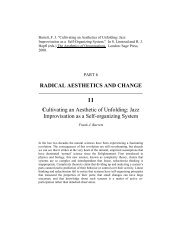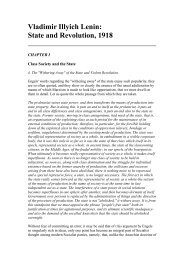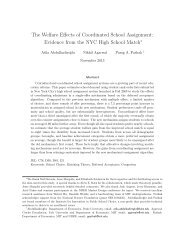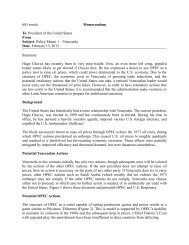What Did You Do in the War, Mutti? Courageous Women ... - iSites
What Did You Do in the War, Mutti? Courageous Women ... - iSites
What Did You Do in the War, Mutti? Courageous Women ... - iSites
You also want an ePaper? Increase the reach of your titles
YUMPU automatically turns print PDFs into web optimized ePapers that Google loves.
584 Robert G. Moeller<br />
fantasies of scal<strong>in</strong>g <strong>the</strong> Caucasus mounta<strong>in</strong>s <strong>in</strong> a Blitzkrieg, dies <strong>in</strong> action. As<br />
she leaves Schwer<strong>in</strong>—part of <strong>the</strong> same ‘German East’ which is <strong>the</strong> sett<strong>in</strong>g for<br />
KMG—<strong>in</strong> advance of <strong>the</strong> Red Army <strong>in</strong> <strong>the</strong> spr<strong>in</strong>g of 1945, she loses her only<br />
child. Attempt<strong>in</strong>g to board a westbound tra<strong>in</strong>, she looks on <strong>in</strong> horror as<br />
ano<strong>the</strong>r tra<strong>in</strong> hits and kills her daughter. She hopes that <strong>in</strong> <strong>the</strong> postwar<br />
period th<strong>in</strong>gs will be better, because ‘we did enough penance <strong>in</strong> <strong>the</strong> war.’ These<br />
hopes, however, are quickly dashed, and her struggle for survival becomes no<br />
easier. She manages by work<strong>in</strong>g <strong>in</strong> a cannery where she crams fish <strong>in</strong>to t<strong>in</strong>s, but<br />
she soon learns that she can smell of better th<strong>in</strong>gs if she deploys her sexuality.<br />
Serial relationships—with a married man and a black marketeer—teach her<br />
that ‘no one needs us women ... <strong>the</strong>y use us.’ Her war and postwar are thus<br />
a ‘hell’ that match Beckmann’s hell at <strong>the</strong> front and <strong>in</strong> a Soviet prisoner-ofwar<br />
camp. National Socialism has betrayed <strong>the</strong>m both. The film opens with<br />
Death and God gambl<strong>in</strong>g for control of <strong>the</strong>se lost souls, but by <strong>the</strong> end of<br />
<strong>the</strong> film, Gehrke has clo<strong>the</strong>d, fed, and nurtured Beckmann, br<strong>in</strong>g<strong>in</strong>g him back<br />
from <strong>the</strong> br<strong>in</strong>k. In <strong>the</strong> process, by exercis<strong>in</strong>g <strong>the</strong>se fem<strong>in</strong><strong>in</strong>e powers, she has also<br />
restored herself. Toge<strong>the</strong>r, woman and man jo<strong>in</strong> <strong>in</strong> a project of salvation and<br />
recovery, and God will help those who have helped <strong>the</strong>mselves. Accept<strong>in</strong>g <strong>the</strong>ir<br />
responsibility for each o<strong>the</strong>r, <strong>the</strong>y can face <strong>the</strong> future. 47<br />
By <strong>the</strong> end of <strong>the</strong> 1940s, films that so relentlessly presented demolished<br />
urban landscapes and broken lives and raised such difficult questions about<br />
blame and guilt were ceas<strong>in</strong>g to be big draws, lead<strong>in</strong>g reviewers to conclude<br />
that audiences were sated with stories that focused only on <strong>the</strong> ‘hopelessness<br />
of <strong>the</strong> first postwar years.’ As one reviewer of Liebe 47 put it, it was ‘time<br />
for spiritual restoration. We have had enough of violent emotions.’ 48 There<br />
was plenty of violence and no shortage of emotions <strong>in</strong> <strong>the</strong> war films of <strong>the</strong><br />
mid-1950s, but a decade after <strong>the</strong> war, violence and emotion were not l<strong>in</strong>ked<br />
to complicated questions of accountability for war crimes, and <strong>the</strong> spectrum<br />
of war memories—men’s and women’s—addressed <strong>in</strong> literature, political<br />
discourse and films had narrowed decidedly. In KMG, Wicki is tortured<br />
by whe<strong>the</strong>r to follow orders not because he fears responsibility for <strong>the</strong><br />
slaughter of <strong>in</strong>nocent civilians by Germans, but because he does not want<br />
47 See Massimo Per<strong>in</strong>elli, Liebe ‘47—Gesellschaft ‘49: Geschlechterverhältnisse <strong>in</strong> der deutschen<br />
Nachkriegszeit (Hamburg, 1999); Ulrike Weckel, ‘Spielarten der Vergangenheitsbewältigung:<br />
Wolfgang Borcherts Heimkehrer und se<strong>in</strong> langer Weg durch die Westdeutschen Medien’, Tel Aviver<br />
Jahrbuch für deutsche Geschichte, 31 (2003), pp. 125 61; also Erica Carter, ‘Sweep<strong>in</strong>g up <strong>the</strong> Past:<br />
Gender and History <strong>in</strong> <strong>the</strong> Post-war German ‘‘Rubble Film"’, <strong>in</strong> Ulrike Sieglohr (ed.), Hero<strong>in</strong>es without<br />
Heroes: Reconstruct<strong>in</strong>g Female and National Identities <strong>in</strong> European C<strong>in</strong>ema 1945 51 (London,<br />
2000), pp. 91 110; Kirsten Burghardt, ‘Moralische Wiederaufrüstung im frühen deutschen Nachkriegsfilm’,<br />
<strong>in</strong> Michael Schaudig (ed.), Positionen deutscher Filmgeschichte: 100 Jahre K<strong>in</strong>ematographie<br />
(Munich, 1996), pp. 246, 264. Gehrke embodies many of <strong>the</strong> symbolic mean<strong>in</strong>gs of ‘woman’<br />
that def<strong>in</strong>ed West German national identity <strong>in</strong> what historian Elizabeth He<strong>in</strong>eman calls <strong>the</strong> ‘hour<br />
of <strong>the</strong> woman’ <strong>in</strong> He<strong>in</strong>emann, ‘The Hour of <strong>the</strong> Woman.’<br />
48 ‘Überholte Filme’, Wirtschaftszeitung (16 July 1949). In general, see Helmut Peitsch, ‘Deutschlands<br />
Gedächtnis an se<strong>in</strong>e dunkelste Zeit’: Zur Funktion der Autobiographik <strong>in</strong> den Westzonen<br />
Deutschlands und den Westsektoren von Berl<strong>in</strong>, 1945 bis 1949 (Berl<strong>in</strong>, 1990).

















